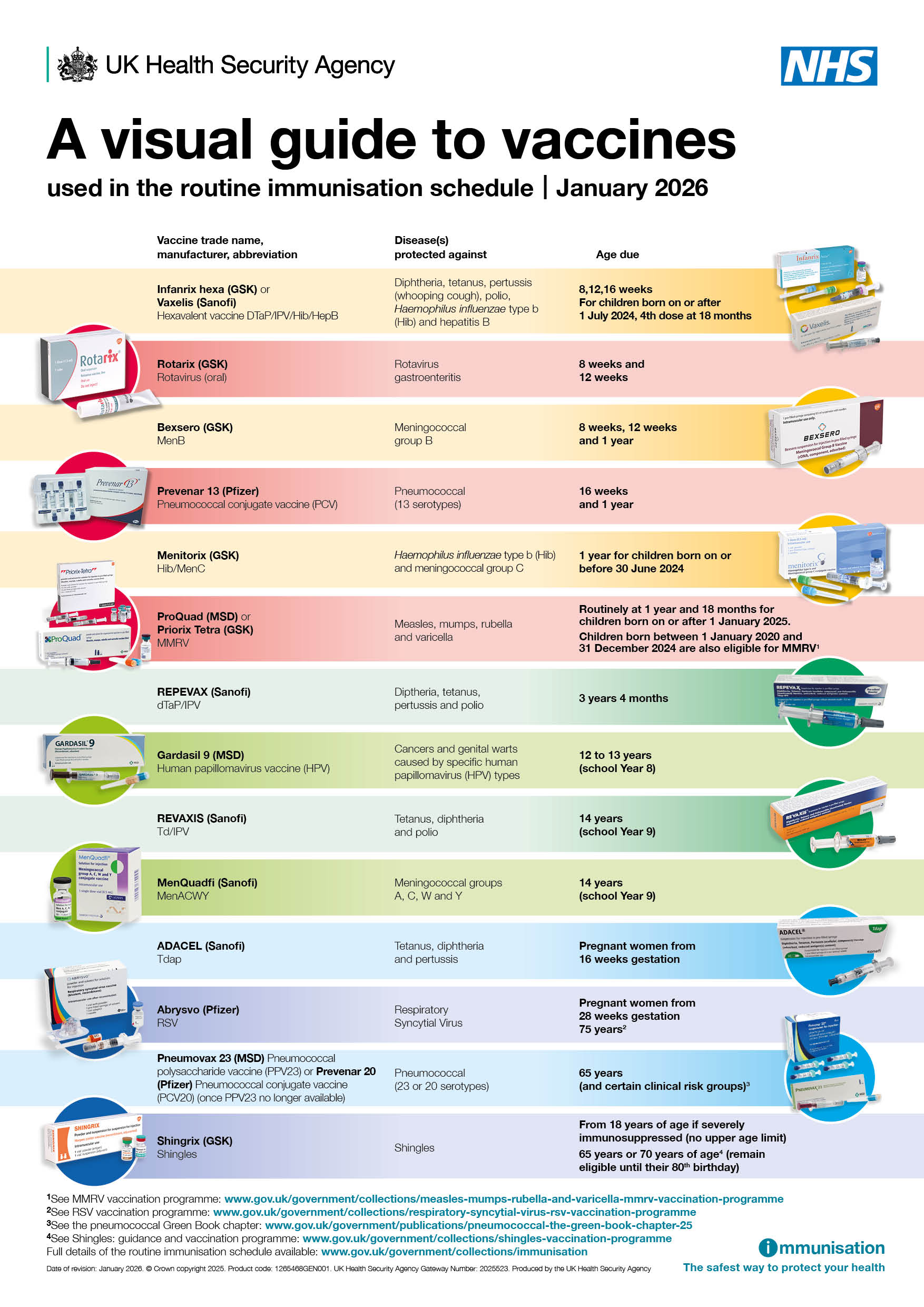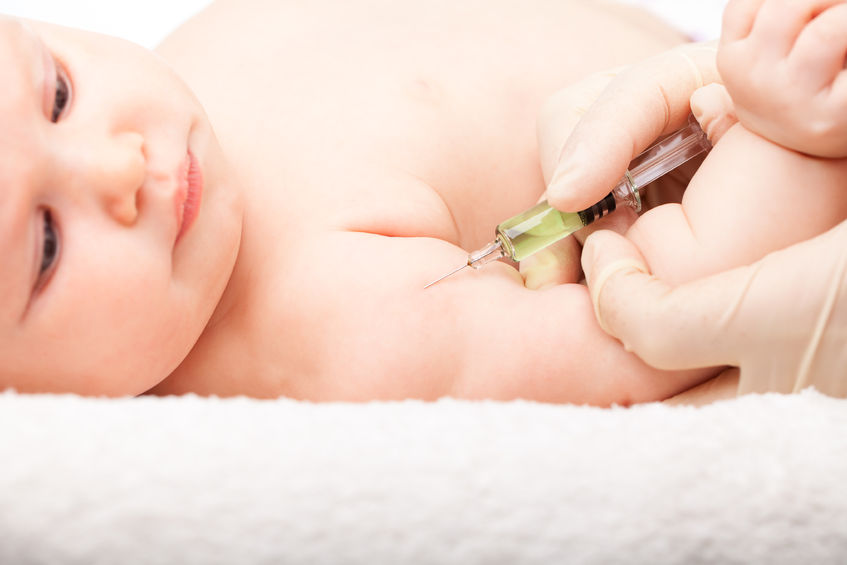
Childhood Vaccinations
One of the best ways to protect your child is to make sure they have all of their vaccinations at the time they are recommended.
To find out what vaccinations your child needs, and when they need to have them, please click on the following website Complete routine immunisation schedule or open the childhood vaccinations section below.

Measles, mumps and rubella are infectious diseases that are prevented by the MMR vaccine.
The MMR vaccine is given to children when they turn one year, and then a booster vaccination is given when the child is around three years and four months old. Children require both vaccinations to be fully protected and they are part of the of routine childhood vaccination schedule.
Unvaccinated or partially vaccinated children in Hertfordshire and West Essex continue to be at risk of catching infections that can be prevented by vaccination. Vaccines are safe, effective and offered free on the NHS.
Measles in particular is on the rise across the UK and Europe. This has resulted in severe illness and even deaths in a number of adults and children. It is highly infectious, and is spread by water droplets, coughed or sneezed by infected individuals. The only protection for this is having both doses of the MMR vaccine.
It is important to catch up on any missed vaccines.
You can still ask your GP surgery for the MMR vaccine if your child has missed either of these 2 doses.
95% of the population need to be vaccinated in order to keep everyone protected (this is sometimes referred to as herd immunity). The BBC has developed a short video to explain what herd immunity is.
For more information about the MMR vaccine, please visit MMR for all: general guide - GOV.UK (www.gov.uk).
Which children are eligible for the flu vaccine?
- all children aged 2 or 3 years
- school-aged children (reception to year 11)
- children with certain long-term health conditions (up to the age of 17)
All eligible children should receive the children's flu vaccine. This is not only to stop them getting unwell with flu, but also to stop them spreading flu to other members of your family. Most children are offered the nasal spray flu vaccine. It is the preferred vaccine for children.
Children (up to the age of 17 years) with long-term health conditions includes children with weakened immune systems and those on steroids or with problems with their spleen, chronic heart or lung problems, diabetes, asthma, chronic kidney or liver disease.
It is especially important that these children are vaccinated because they have the greatest risk of becoming very unwell if they get flu. Children aged from 6 months to 2 years who are at risk from complications of flu should be given the inactivated (injected) flu vaccine rather than the intranasal vaccine.
How can children get the flu vaccine?
Children aged 2 or 3 years on 31 August 2025
To get a flu vaccine for a child aged 2 or 3 years old, you can:
- contact their GP surgery to book an appointment
- book a free NHS flu vaccination at a pharmacy online or in the NHS App
- find a pharmacy that offers free NHS flu vaccination where your child can get vaccinated without an appointment (walk-in)
You should get an invitation from your GP surgery, or be able to contact them, in autumn or early winter to book an appointment.
School-aged children (reception to year 6)
Most school-aged children (Reception to Year 11) get their flu vaccine at school.
You should get an invitation from your child's school or the School Age Immunisation Service to get their vaccine, usually during the autumn term.
If your child misses their vaccination at school or if they are home educated (home-schooled), they should be offered a flu vaccine at a community clinic.
If your child is 4 years old but has not started school yet, they can get vaccinated at either:
- a community clinic – if they turned 4 years of age on or before 31 August 2025
- their GP surgery or a pharmacy that offers flu vaccination – if they turned 4 years of age after 31 August 2025
Children with certain long-term health conditions
Children with certain long-term health conditions that put them at higher risk from flu can get a flu vaccine from their:
- school (if they're in Reception to Year 11)
- GP surgery
If your child is in Reception to Year 11, they should get an invitation from their school or the School Age Immunisation Service to have the vaccine, usually during the autumn term.
If your child is not in school or you want to vaccinate your child earlier than when it's offered at school, contact their GP surgery in autumn or early winter to book an appointment.
Common myths about flu and the flu vaccine
'Flu isn't serious, so my child doesn't need a flu vaccine' and 'My children never get ill, so they don't need the vaccine'
It is tempting to think that flu is no worse than a bad cold, but in fact it is a serious illness which can infect anyone and can cause serious complications. For people at risk of complications e.g. grandparents or other vulnerable household members, flu can lead to hospitalisation or even death. Flu leads to hundreds of thousands of GP visits and tens of thousands of hospital stays a year.
'Last year my children had the flu vaccine but they got ill anyway, so it doesn't work'
No vaccine is 100% effective, including the flu vaccine. However, the vaccine usually prevents about half of all flu cases. For people who get flu after being vaccinated, the disease is often less severe than it would have been. It is important to remember that the flu vaccine only protects against flu, but there are other illnesses which have flu-like symptoms which you can still catch after getting the flu vaccine. It takes up to two weeks for the vaccine to take effect, so you could still catch flu if you are exposed to the virus during this time. Getting vaccinated as early as possible in the season can help to prevent this.
Use this video to explain to your child why they are having the flu vaccine
Travel vaccinations
If you're planning to travel outside the UK, you may need to be vaccinated against some of the serious diseases found in other parts of the world. If possible, see your GP or a private travel clinic at least 6 to 8 weeks before you're due to travel. Some vaccines need to be given well in advance to allow your body to develop immunity. And some vaccines involve a number of doses spread over several weeks or months.
Information on available travel vaccines can be found:
Some countries require proof of vaccination (for example, for polio or yellow fever vaccination), which must be documented on an International Certificate of Vaccination or Prophylaxis (ICVP) before you enter or when you leave a country.
Saudi Arabia requires proof of vaccination against certain types of meningitis for visitors arriving for the Hajj and Umrah pilgrimages.
Even if an ICVP is not required, it's still a good idea to take a record of the vaccinations you have had with you.
For information about travel advice including vaccines recommendations, malaria and outbreaks, please see:
· NaTHNaC - Home (travelhealthpro.org.uk)
· Destinations - Fit for Travel
Travel Vaccinations: What Parents Need to Know
Planning a Trip?
If you're planning a trip outside the UK, it's important to check if you and your family need any vaccinations to protect against serious diseases found in other parts of the world. Here's a simple guide to help you navigate travel vaccinations.
When to See Your GP
Try to visit your GP or a private travel clinic at least 6 to 8 weeks before your travel date. Some vaccines need time to work, and others may require multiple doses over several weeks or months.
Where to Find Vaccine Information
You can find detailed information on available travel vaccines here: Available travel vaccines - NHS (www.nhs.uk)
Proof of Vaccination
Certain countries may require proof of vaccination, documented on an International Certificate of Vaccination or Prophylaxis (ICVP). For example:
· Polio
· Yellow Fever
Special Requirements:
Saudi Arabia: Visitors for the Hajj and Umrah pilgrimages must show proof of vaccination against specific types of meningitis.
Keep a Record
Even if an ICVP is not needed, it's a good idea to carry a record of all the vaccinations you and your family have received.
Additional Resources
For more detailed travel advice, including vaccine recommendations, malaria prevention, and outbreak information, visit:
· NaTHNaC - Home (travelhealthpro.org.uk)
· Destinations - Fit for Travel
Stay safe and enjoy your travels!
It is normal to have questions about any medication that you’re giving to your child and vaccines are no exception. The most common questions that parents ask are:
What vaccinations does my child need?
You can find out what vaccinations your child needs, and when they need to have them by clicking on the following website Complete routine immunisation schedule.
Why should I have my child vaccinated?
The NHS has produced a short video to explain why it is important to get your child vaccinated. In summary, they are an important way to stop the spread of disease and protect us from serious illness.
What is herd immunity?
The BBC has developed short video to help explain what herd immunity is. In summary, If enough people are vaccinated, it's harder for the disease to spread to those people who cannot have vaccines. For example, people who are ill or have a weakened immune system.
Won’t herd immunity protect my child?
Herd immunity does not protect against all diseases. The best example of this is tetanus, which is caught from bacteria in the environment, not from other people who have the disease. In addition, for herd immunity to work properly, most people in the population need to be vaccinated. There are low vaccination rates in some parts of the UK and in some communities, as well as in many overseas countries. This means that if your child is not vaccinated, it is quite likely that many of the people they come into contact with will not be vaccinated either. So if one person gets an infectious disease, it can spread quickly through all the unvaccinated people in the group insert video.
Won’t having several vaccines at the same time overload my baby’s immune system?
Parents often worry that a child’s immune system will not be able to cope with several vaccines at once. In fact, even a tiny baby’s immune system can cope easily. Starting from birth, babies come into contact with millions of germs every day. It is estimated that the human body contains enough white blood cells to cope with thousands of vaccines at any one time. If a child was given 11 vaccines at once, it would only use about a thousandth of the immune system. It is not a good idea to delay vaccinations to ‘spread the load’, because it leaves the child unprotected against serious diseases for longer.
How do I know that vaccines are safe?
All vaccines go through a long and thorough process of development and testing before they are licensed for use. Vaccines have to be tested on adults and children separately before they can be used for different age groups; this is because vaccines that work in adults may not work so well in children. No vaccines are tested on children before they have been fully tested on adults. Click here for more information about vaccine safety and side effects.
The importance of getting your child Vaccinated
- Immunisations can save your child’s life: Many of the diseases that are vaccinated against can be very serious. If a child isn’t vaccinated against certain illnesses these can spread easily and become life threatening.
- Vaccinations are very safe and effective: All vaccines go through a long and thorough process of development and testing before they are licensed for use. Vaccines have to be tested on adults and children separately before they can be used for different age groups; this is because vaccines that work in adults may not work so well in children. No vaccines are tested on children before they have been fully tested on adults.
- Immunisation protects others you care about: Vacination can help to stop the spread of infectious disease from person to person, protecting those who you care about from serious illness.

